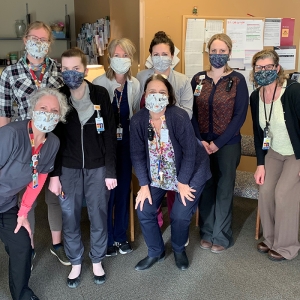Remaining Fluid During Crisis
May 20, 2020 / by Jacqueline Mazarella- Alumni
At the beginning of February 2020, Jesiah Ahlemeier, MSW ’16, began working in the ICU at M Health Fairview St. Joseph’s Hospital in St. Paul, Minnesota as a case manager and discharge planner. Within a month, she was in the middle of the COVID-19 pandemic.
Previously, Ahlemeier was a hospice social worker and a relief worker after the earthquake in Peru and the hurricane in New Orleans. With a background in architecture, she has always worked within the realm of rebuilding.
“It’s interesting coming into the hospital because you’re still in this very high acuity-needed space, but are questioning how it will all play out, how to manage your stress and keep everybody around you safe,” Ahlemeier said.
As a first response worker at the hospital, she receives daily COVID updates from leadership trying to manage the ever-changing landscape.
“Every transition has these weird turning points where the leadership folks have not had enough time to put everything in place, and then they put it in place and then things change,” Ahlemeier said. “We just do this constant feedback loop, with us on the ground saying ‘this is what we need,’ and everybody else who is trying to prepare for that, matching it. So far I think that we've done really well incorporating that and just being fluid.”
A delicate balance
St. Joseph’s Hospital was established in 1853, and the nuns who ran it cared for patients during the 1918 flu pandemic. It has a partnership with Bethesda Hospital, a former long-term acute care facility located down the street, that was quickly converted and designated for COVID-positive-only patients at the beginning of the crisis. Patients admitted to St. Joseph’s who were COVID-positive and needed hospitalization, or were unable to go home because of their care facility’s policies or required more assistance, were transferred to Bethesda.
Today, however, in the quickly changing landscape of caring for patients, St. Joseph’s also now has sections of the hospital designated to care for COVID-positive patients.
In order to save on the vital PPE that the hospital needs, social workers do not enter rooms. Instead, they call patients from their offices or from floor phones to talk. Their job is more vital than ever to help patients connect to loved ones. As one of Ahlemeier’s associates said, “be that ear to listen for patients who are lonely.”
Ahlemeier works with patients, by phone within the hospital, to determine discharge plans home or to transitional facilities.
Recently, iPad video conferencing software has been rolled out in order to keep people connected. In very specific circumstances that are usually end-of-life related, St. Joseph’s is still allowing one visitor. For these patients, the video conferencing with one family member at bedside to assist with decision-making and allowing the rest of the family to say goodbye has been effective and an awesome integration of technology.
“I think there’s a delicate balance between keeping our rights and our humanity upon us with all of this going on,” Ahlemeier said.
There is a general stress about how everything has changed, just like everywhere else in the nation. The staff rotates taking days off or adding days when needed in order to take care of each other. The hospital administration has also been able to replenish the supply of PPEs on a regular basis, so they have not experienced a shortage.
Reducing stress
“I think keeping your own immunity as strong as possible is important,” Ahlemeier said. “If you need to limit your media intake—do that. Make sure you're getting enough exercise. All the normal things.”
If people have the means and are able to help others, Ahlemeier suggests supporting health care workers by offering home-cooked meals, and helping with pet care and child care.
The population of seniors that are more isolated than usual also need attention. “Whether that’s standing outside nursing homes singing, which I’ve seen here, or trying to have video-conferencing, or making a sign—anything that can keep them connected would be great,” Ahlemeier said.
For herself, Ahlemeier spends time with her dog and enjoys being outside. She has been a builder for years, so using her circular saw to create new things calms her. Also, reaching out to friends is always helpful.
“I take seconds to freak out, for sure,” she said. “But only in moderation.”
To reference the work of our faculty online, we ask that you directly quote their work where possible and attribute it to "FACULTY NAME, a professor in the USC Suzanne Dworak-Peck School of Social Work” (LINK: https://dworakpeck.usc.edu)
